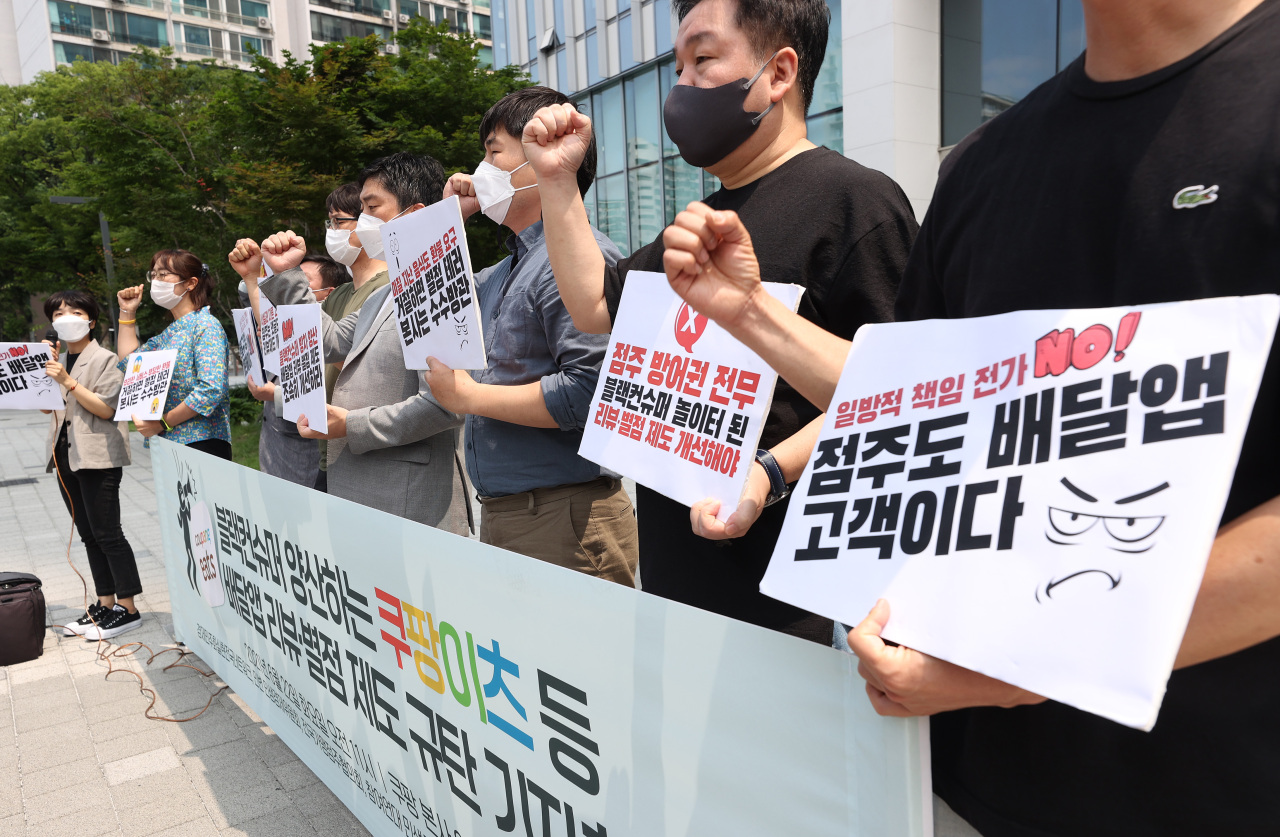[News Focus] Korea to curb malicious reviews on food delivery apps
New state guidelines and dispute arbitration panel aim to push platform operators such as Coupang to better protect small restaurant owners
By Yang Sung-jinPublished : July 12, 2021 - 18:00

South Korea plans to introduce a set of policy measures aimed at protecting restaurant owners against malicious food app reviewers, amid a rapid increase of online food orders due to the COVID-19 pandemic, the country’s top telecom regulator said.
The Korea Communications Commission said Sunday it would push for new guidelines to prevent malicious reviews on food delivery apps and step up monitoring of major platform operators involved.
“Now that people carry out many activities within platform services, the number of related side effects is rapidly going up,” said Han Sang-hyuk, chairman of the KCC. “We will utilize all the possible policy measures under the current legal framework to better protect platform service users.”
The KCC said it would ask platform operators to improve consumer review systems, often on a five-star scale, while allowing them to take measures against clearly exaggerated or intentionally negative consumer reviews. In addition, it plans to establish a dispute arbitration committee over complaints on platform services.
“To prevent malicious reviews and abuse of star rating systems, we will take not only policies that can be implemented right away, but also long-term measures in hopes of strengthening positive aspects of review systems and minimizing side effects,” Han said.
The KCC unveiled five major policy measures designed to reduce the cases in which those who rely on online platforms to sell their products suffer malicious comments and endure stress in dealing with malevolent consumers.
First, the regulator plans to overhaul consumer review systems by setting up guidelines involving both business operators and consumers. Fair and transparent review systems are crucial sales tools for online business operators, as consumers tend to take into account other people’s comments on service quality on food apps.
The KCC said it would ask app operators to follow the guidelines voluntarily to quickly address the review-related problems while exploring a revision to the related law as part of efforts to reform the system in the long term.
Second, the KCC plans to require more companies to submit data regarding the protection of users under the Telecommunications Business Act. The regulator recently added nine operators, including Coupang, Naver Shopping, Baedal Minjok, Netflix and AfreecaTV, to the list of companies subject to regular appraisal.
The KCC said it would check whether online platform operators are following the new guideline on review systems as part of the broader service appraisal, which can be disclosed the public under the law.
Third, the KCC said it would join forces with public and private agencies to introduce a hotline for helping platform users and business operators to resolve conflicts. As complaints and damage related to platform services are getting complicated, the KCC said it would respond to complaint cases directly or seek help from related authorities.
Fourth, the KCC would seek an amendment to the Act on Promotion of Information and Communications Network Utilization and Information Protection in a way that better protect platform users against malicious reviewers. The revised act, if passed, would allow platform business operators to take steps to remove comments that meet certain conditions including the level of exaggeration and the possibility of damaging sales of business owners.
The fifth measure is the establishment of what is temporarily named the “Platform Dispute Arbitration Committee.” The new station agency is expected to be set up if the National Assembly passes the Online Platform User Protection Act proposed by Rep. Jeon Hye-sook of the ruling Democratic Party of Korea.
The KCC said if the proposed act is passed, the government will be able to require platform operators to disclose specific rights and obligations involving platform users, such as restaurant owners, and establish the dispute arbitration committee to settle conflicts among platform operators, business owners and consumers.
The comprehensive package of reform measures by the KCC comes as a growing number of people tend to order food via delivery apps due to the prolonged COVID-19 pandemic, leading to more complaints and conflicts.
Most food delivery apps provide rating systems in which consumers can leave comments and photos along with an evaluation on a five-star rating, whose influence on consumers and restaurant owners continues to grow.
At issue is a surge in the number of malicious consumers who threaten eatery owners with negative reviews or a one-star evaluation, demanding a discount or extra food. In many cases, restaurant owners are forced to apologize or offer refunds, even in the absence of a problem with the quality of food or service.
Critics claim that food delivery app operators are to blame, as they fail to take necessary measures to protect restaurant owners and sort out intentionally negative reviews seeking free food or refunds.
The pent-up anger against platform operators and malicious reviewers exploded last month upon the death of a small restaurant owner in Seoul who allegedly suffered great stress after a customer called for a refund. The customer ordered food through Coupang Eats, a food delivery unit of Coupang, and made what the bereaved family claimed was an “unreasonable” demand for a refund over a single piece of fried shrimp. The business owner collapsed while handling the customer’s complaint and died of a brain hemorrhage three weeks later.
Civic groups held protests in front of Coupang’s headquarters in Seoul, criticizing Coupang Eats’ delivery app review system that produces malicious consumers. They claimed that food app reviews directly affect consumers’ choice and sales, so the cases of unreasonable demands from consumers are on the rise. According to a survey on delivery app usage released last month, 63.3 percent of restaurant owners in Seoul, Gyeonggi Province and Incheon have suffered damage caused by malicious customer reviews.
In response to growing public calls for reform, Naver, the country’s biggest portal, decided to change its controversial rating system for restaurants and cafes. Instead of a star rating system, Naver plans to introduce a keyword review system within the third quarter of this year, allowing consumers to select the keyword that matches their emotions.
In major online communities, some users have argued that the KCC’s measures have limitations as long as food delivery apps and portals keep review features. “Why do they keep the review system even though many of the reviews cannot be trusted in the first place,” posed a user on online community Clien, calling for a ban of comment and star rating systems on delivery apps.



















![[Today’s K-pop] Treasure to publish magazine for debut anniversary](http://res.heraldm.com/phpwas/restmb_idxmake.php?idx=642&simg=/content/image/2024/07/26/20240726050551_0.jpg&u=)